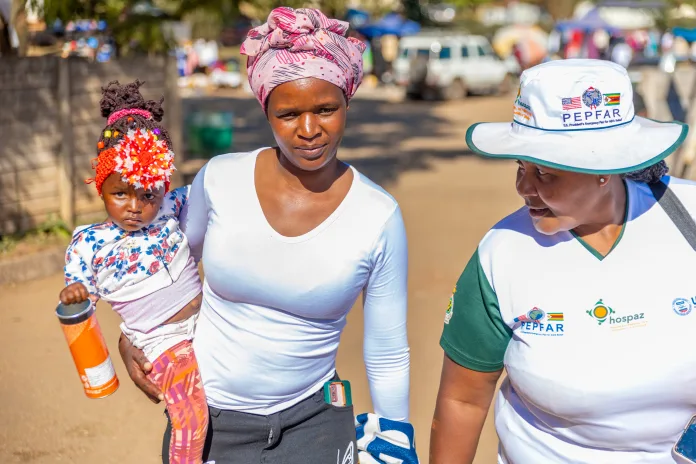By Johnson Siamachira
Harare, (New Ziana) – In the heart of Matabeleland South province, where the sun blazes down on the sprawling landscapes and the struggles of daily life persist, heroes and heroines emerge from the shadows.
They are not clad in capes or armour, but rather in simple attire that blends with the communities they serve. These are Zimbabwe’s community health workers (CHWs), the unsung champions of healthcare, who tirelessly bridge the gap between the formal health system and the communities but most importantly with marginalised populations.
The rationale for deploying CHWs in Zimbabwe is clear: they are pivotal in extending primary health care to remote areas, ensuring that health services reach those who need them most. Dr Ronald Ncube, executive director of the Union Zimbabwe Trust (UZT), emphasises their importance: “CHWs empower communities by promoting wellness and preventing diseases. They play an essential role in addressing public health challenges, especially in areas where traditional healthcare access is limited.”
In a nation grappling with high disease burdens, the work of CHWs has transformed lives through initiatives like the Kunda-Nqob’iTB project, led by the UZT. The initiative, which started in 2019 and was concluded in 2024, trained over 900 CHWs across eight districts in three provinces – Matabeleland South, Midlands and Mwenezi. Through the project, significant strides have been made in tuberculosis (TB) screening and referrals. From 2019 to 2024, the number of clients screened for TB surged from 47,457 to 284,958, with 2,699 cases diagnosed—a demonstration to the effectiveness of grassroots healthcare.
Merry Maimbo, a dedicated CHW from Gwanda district in Matabeleland South Province, has emerged as a beacon of hope in her community. The district enrolled 120 CHWs in 2020. Of the 120, Merry Maimbo reporting at Phakama Clinic in Ward 7 in Gwanda town, was identified as the most outstanding in 2023. Through her work with Phakama Clinic staff, Maimbo outclassed her counterparts in the manner in which she executed her duties on ending TB. During her community TB activities, she ensured that no high- risk client was left behind. By 2023, she clocked 20(18 males, two female) clients diagnosed with TB at both Phakama Clinic and Gwanda Provincial Hospital.
“I target high-risk groups with courage, commitment, determination, passion and a conquering spirit,’’ said Maimbo. Gwanda Town has high-risk groups, including sex workers, artisanal miners, and push cart boys.
“I found that the pushcart boys, often ignored, were at high risk for TB due to their exposure to soil and hazardous conditions,” she explains, recounting her efforts to screen and educate these young men. Maimbo’s initiatives led to the referral of four boys for diagnosis, one of whom was confirmed to have TB. “We are not just health workers; we are advocates for our communities,” she says with pride.
However, the path is fraught with challenges. Many CHWs traverse long distances on foot, often facing physical exhaustion and harsh weather conditions. “Sometimes, I wonder if it’s worth it.” Yet, her resolve never wavers. Community support, peer networks, and ongoing training help mitigate these challenges. “We support each other; that camaraderie keeps us going,” she adds.
The Kunda-Nqob’iTB project did not only increase TB screenings, it also fostered a culture of health awareness in communities. The statistics speak volumes: 1,174,681 community members screened, and 53,810 referred for further care. This grassroots initiative relies heavily on the dedication of CHWs, whose relentless efforts yield tangible health outcomes.
Dr Andrew Muza, the Provincial Medical Director for Matabeleland South in the Ministry of Health and Child Care, acknowledges this impact, stating, “CHWs are the backbone of our public health system. Their work is integral to improving health access and outcomes, particularly in remote rural settings.”
Despite their crucial role, CHWs face significant hurdles. Inadequate financial support often leaves them demotivated. “It’s disheartening to work so hard and not see adequate compensation,” confesses Sebenzile Nkomo, a village health worker in Bulilima. “But we push through, knowing our communities rely on us.”
Innovative solutions are emerging to counteract these challenges. Some districts have introduced bicycles and mobile technology to ease travel challenges. “With a bicycle, I can visit more families in a day,” Maimbo notes. “It changes everything.”
CHWs engage communities through home visits, educational campaigns, and outreach programs. Under the CUFF-TB Project, implemented by UZT, CHWs are mobilising local miners for TB screenings, ensuring that at-risk populations receive necessary care. “It’s about building trust,” Nkomo explains. “When people see us regularly, they know we care.”
Looking ahead, UZT plans to enhance the role of CHWs by integrating technology into their workflow. “We aim to equip CHWs with tablets and smartphones to streamline data collection and improve communication,” Dr Ncube reveals. This approach will not only increase efficiency but also empower CHWs with real-time data to better serve their communities.
In Matabeleland South, the journey of community health workers is a testament to resilience and commitment. Despite challenges, these bare foot soldiers of health remain steadfast in their mission to bring care to the doorstep of those in need. As Maimbo poignantly says,
“We may not wear capes, but we are heroes and heroines in our own right, fighting for the health and well-being of our people.” Their stories remind us that in the face of adversity, hope is alive, driven by the unwavering spirit of those who dare to care.



